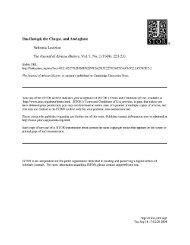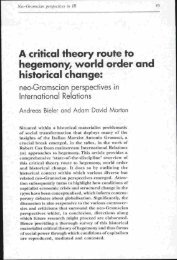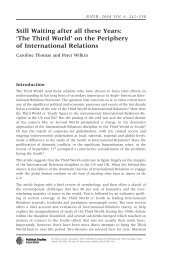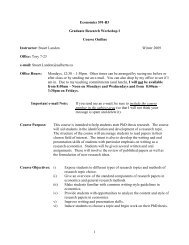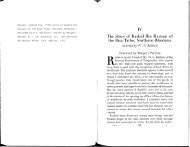Is comparative politics dead? Rethinking the field in the post-Cold ...
Is comparative politics dead? Rethinking the field in the post-Cold ...
Is comparative politics dead? Rethinking the field in the post-Cold ...
You also want an ePaper? Increase the reach of your titles
YUMPU automatically turns print PDFs into web optimized ePapers that Google loves.
HOWARD J WIARDA<strong>in</strong> <strong>the</strong> political sphere; certa<strong>in</strong>ly democracy is <strong>the</strong> only system of government thatenjoys widespread global legitimacy. No regime wants to be called `corporatist’or `Marxist±Len<strong>in</strong>ist’ anymore; both of <strong>the</strong>se system alternatives have beendiscredited. In addition, with <strong>the</strong> collapse of <strong>the</strong> Soviet Union, <strong>the</strong> cold warcon¯ ict between capitalism and communism has largely run its course, and <strong>the</strong>reis only one real superpower left. The success particularly of <strong>the</strong> East Asianeconomies and <strong>the</strong> failures of Cuba, Nicaragua and Eastern Europe demonstrated<strong>the</strong> advantages of private market <strong>in</strong>itiatives over a totally controlled system.Obviously, <strong>the</strong>re is and will cont<strong>in</strong>ue to be debate between advocates of freermarkets and state downsiz<strong>in</strong>g, and those who would preserve statism and a largerwelfare state, but <strong>in</strong>creas<strong>in</strong>gly <strong>the</strong>se <strong>in</strong>volve <strong>the</strong> <strong>politics</strong> of compromise andmoderation (socialist governments <strong>in</strong> <strong>the</strong> UK and Portugal follow<strong>in</strong>g free marketstrategies, right-of-centre governments (under Kohl) <strong>in</strong> Germany and Spa<strong>in</strong>expand<strong>in</strong>g welfarism, virtually everyone else also seek<strong>in</strong>g to comb<strong>in</strong>e free-marketpolicies with strong social programmes) ra<strong>the</strong>r than <strong>the</strong> <strong>politics</strong> of ei<strong>the</strong>r/or.The great systems debates of <strong>the</strong> past are largely over, and with that changehas come a decl<strong>in</strong>e <strong>in</strong> <strong>in</strong>terest <strong>in</strong> <strong>comparative</strong> <strong>politics</strong>. A paradigm shift is underway: whereas <strong>in</strong> <strong>the</strong> 1960s <strong>the</strong> parabola that is <strong>the</strong> rise and fall of <strong>comparative</strong><strong>politics</strong> was on <strong>the</strong> way up; today it is on <strong>the</strong> way down. Graduate students areless <strong>in</strong>terested <strong>in</strong> <strong>the</strong> ® eld because <strong>the</strong> excitement of new research ® elds and new<strong>the</strong>oretical frameworks has died down and, s<strong>in</strong>ce <strong>the</strong> 1970s, <strong>the</strong>re seem to be nogreat conceptual <strong>in</strong>novations or breakthroughs comparable to those of earlierdecades. As such states as Spa<strong>in</strong>, Portugal and Russia have (<strong>in</strong> vary<strong>in</strong>g degree)become democratic, jo<strong>in</strong>ed Europe, and become `normal’ countries, <strong>the</strong>y havealso become more bor<strong>in</strong>g. The `thrill’ <strong>in</strong> <strong>comparative</strong> <strong>politics</strong> is gone; <strong>the</strong>re arestill a host of <strong>in</strong>terest<strong>in</strong>g and important issues to study but <strong>the</strong> great systemsdebates of <strong>the</strong> past appear to be over. There has been a certa<strong>in</strong> `decl<strong>in</strong>e ofideology’ ; 4 <strong>the</strong>re is a certa<strong>in</strong> `end of history’ . 5 So <strong>the</strong> questions we seek to assesshere are how and why <strong>the</strong> ® eld went from excit<strong>in</strong>g to bor<strong>in</strong>g, whe<strong>the</strong>r <strong>comparative</strong><strong>politics</strong> is <strong>in</strong> fact <strong>dead</strong>, and what subjects are still <strong>in</strong>terest<strong>in</strong>g and worthyof study.Comparative <strong>politics</strong>: <strong>the</strong> queen of <strong>the</strong> discipl<strong>in</strong>eIn 1955 Roy Macridis had launched a diatribe aga<strong>in</strong>st traditional <strong>comparative</strong><strong>politics</strong>. 6 He accused <strong>the</strong> ® eld of be<strong>in</strong>g formal±legalistic (study<strong>in</strong>g formal<strong>in</strong>stitutions over non-formal political processes), descriptive ra<strong>the</strong>r than analytic,case study-orientated ra<strong>the</strong>r than genu<strong>in</strong>ely <strong>comparative</strong>, and Eurocentric with itsemphasis on Great Brita<strong>in</strong>, France, Germany and <strong>the</strong> Soviet Union. Macridis’ scritique had a strong effect on <strong>the</strong> `Young Turks’ beg<strong>in</strong>n<strong>in</strong>g to write <strong>in</strong> <strong>the</strong> ® eld<strong>in</strong> those days. In addition, <strong>the</strong> revolution <strong>the</strong>n occurr<strong>in</strong>g <strong>in</strong> political science moregenerallyÐ behaviouralism, <strong>the</strong> study of decision mak<strong>in</strong>g, <strong>the</strong> emphases on<strong>in</strong>formal actors such as political parties and <strong>in</strong>terest groups, research on publicop<strong>in</strong>ion and political processesÐ also had a profound impact on <strong>comparative</strong><strong>politics</strong>. 7Along with <strong>the</strong> Macridis critique, <strong>in</strong> <strong>the</strong> late 1950s and early 1960s came <strong>the</strong>sudden emergence onto <strong>the</strong> world scene of a large number of new nations. The936



